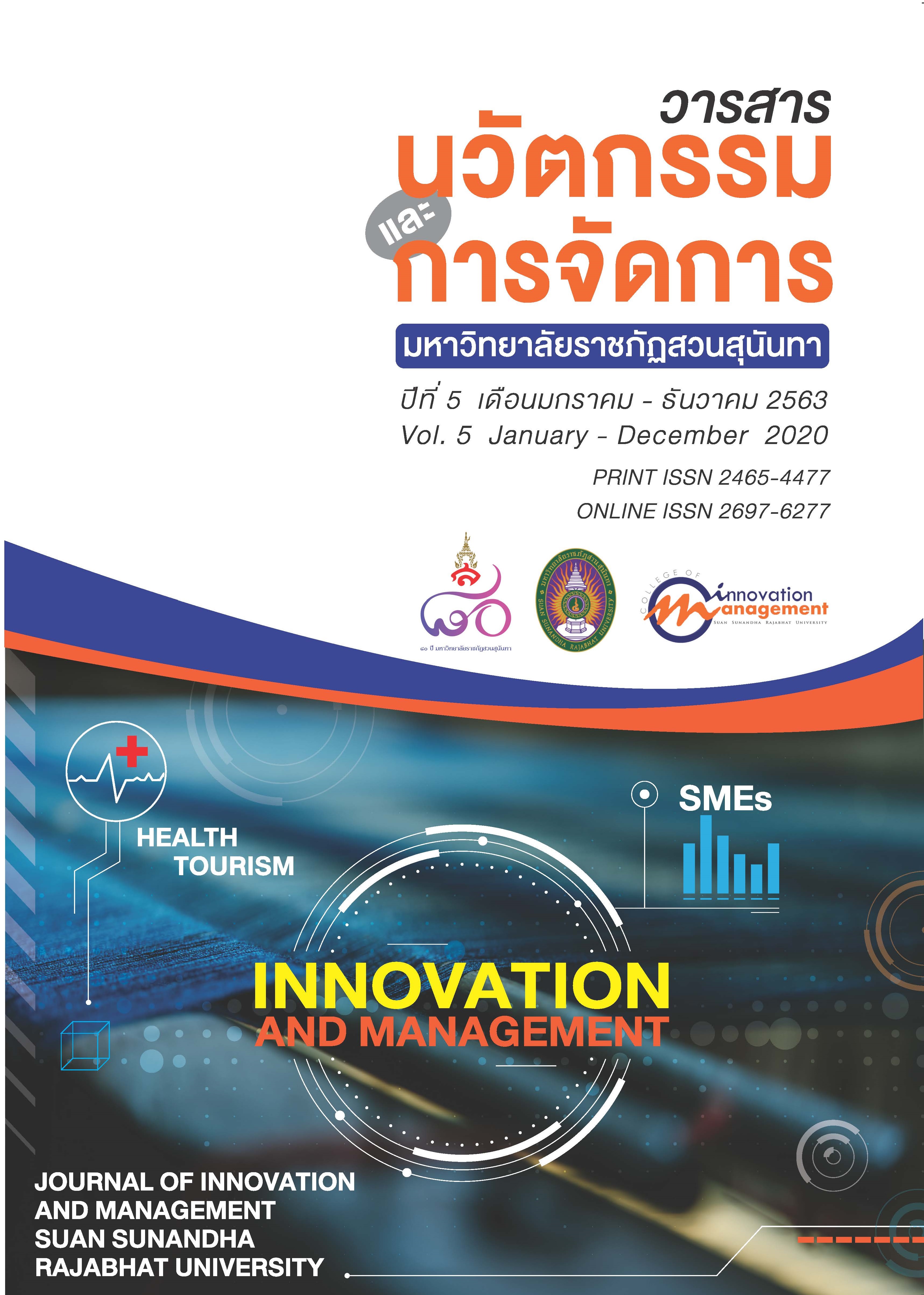Folk Wisdom Knowledge Management Model for Hand-Woven Cotton Fabric of Lua in the North of Thailand
Keywords:
Knowledge Management Model, Folk Wisdom, Hand-Woven Cotton Fabric of Lua, LuaAbstract
The research on Folk Wisdom Knowledge Management Model for Hand-Woven Cotton Fabric of Lua in the North of Thailand is focused on folk wisdom knowledge management for hand-woven cotton fabric of Lua at Ban Mued Long, Ban Tab Sub-district, Mae Chaem District, Chiang Mai Province to gain the knowledge management model of folk wisdom on hand woven-cotton fabric of Lua in the North of Thailand. The objectives are 1) to study on state of knowledge management and necessary body of knowledge 2) to create the knowledge management model and 3) to evaluate such knowledge management model. Population scope and study methods comprise of 3 parts: 1) study of on state of knowledge management and necessary body of knowledge and 2) creating the knowledge management model from information acquired by interviewing 9 persons consisting of Lua people with hand-woven fabric skills, experts of Lua’s hand-woven fabric, and academics in this field and 3) to evaluate the mentioned knowledge management model by 7 persons consisting of knowledge management academics, hand-woven fabric experts, and stakeholders. The research result shows that the body of knowledge on hand-woven fabric of Lua, Ban Mued Long, Ban Tab Sub-district, Mae Chaem District, Chiang Mai Province consists of 1) the body of knowledge on cotton fiber production, decoration on cotton fabric and cotton weaving 2) the body of knowledge on dyeing 3) the body of knowledge on fabric and utilization of hand-woven fabric. The acquired knowledge has been processed through 4 steps of knowledge management according to a conceptual framework on system model of knowledge management of Marquardt including 1) knowledge acquisition through observation, touch, research and comparison which refers to a starting material or an original object from ancient woven fabric in a family. Knowledge and understanding in basis of hand-woven fabric of Lua is also required. Such knowledge and understanding can be acquired through question and conversation with weavers or experts in weaving in the village. Recommendation, teaching, observance or imitating weavers in the village can also be applied. 2) knowledge creation through observation and experiment which are the way of self-learning and practice to build expertise that would require creativity within an original framework. This activity also includes learning weaving technique and new pattern development. Those could be acquired from knowledge acquisition and practical knowledge creation through observation and experiment to correspond to utilization demand and duration 3) informal knowledge sharing within the group which is talking, teaching and learning through villagers and the formal one through various forms of meetings, teaching and trainings that are organized by the community or government agencies or private sectors. Those learning events should have clear objectives, benefits and process. This also includes observation as another way of learning through rite and belief that are internally organized. This includes observation on costume in the rites, listening to stories or words used in the rites 4) knowledge application which can be executed by directly applying knowledge that has been acquired during knowledge acquisition, knowledge creation and knowledge sharing by oneself and choosing applicable knowledge to apply by oneself.
References
Brooking, A. (1999). Corporate Memory: Strategies for Knowledge Management. London: Thomson International Business Press.
Dam-Nern, P. (2006). Knowledge management in the community. Buriram: Buriram Rajabhat University. (in Thai)
Davenport, T. H. (1997). Information ecology. New York: Oxford University Press.
Dee Si Tham, K. (2003). Increasing productivity in industrial work. Publishing House, Electrical and Electronics Institute. Bangkok: Sun Ad and Print Limited Partnership. (in Thai)
Jindawong, P. (2006). Knowledge Management = Knowledge Management: The Experience. Bangkok: CWC. Printing. (in Thai)
Marquardt, M.J. (2002). Building the Learning Organization: A Systems Approach to Quantum Improvement and Global Success. New York: McGraw-Hill.
Nonaka, I. (1994). A dynamic theory of organizational knowledge creation. Organization Science, 5(1), 14-37.
Raj, M. (1996). Encychopadic of Psychology and Education: Volumn 3 (M-Z). New Delhi: ANMOL Publications PVT.
Sirindhorn Anthropology Center. (1999). Society and culture in Thailand. Thailand: Culture and society. Sisa-at, B. (2002). Initial research. 7th ed. Bangkok: Suveeriyasan. (in Thai)
Tantikul, J. and Sitthiwarongchai, C. (2017). Factors affecting employee engagement with the organization of Garment Co., Ltd. Innovation and Management Journal, 2, 54-66. (in Thai)
Thongdeerert, C. (2004). Local knowledge: Knowledge management towards social management. Bangkok: College of Social Management. (in Thai)
Wichianpanya, P. (2004). Knowledge Management: Fundamentals and Applications. Bangkok: P.O. (in Thai)
Wigg, K. (1993). Knowledge Management Foundations. Arlington: Schema Press.
Wipawin, N. (2004). Knowledge management and knowledge base. Bangkok: SR Printing Mass Products. (in Thai)
Withet, N. (1999). Knowledge Management: Techniques for translating knowledge into competitive advantage. (Translated from Thomas H. Davenport, Lawrence Przac). Bangkok: Print D. (in Thai)
Yosyingyong, K. (2006). Organization knowledge management and case studies. Bangkok: Mr. Copy (Thailand) Ltd. (in Thai)
Downloads
Published
How to Cite
Issue
Section
License
Copyright (c) 2020 Journal of Innovation and Management

This work is licensed under a Creative Commons Attribution-NonCommercial-NoDerivatives 4.0 International License.
See Publication Ethics https://so03.tci-thaijo.org/index.php/journalcim/Ethics






